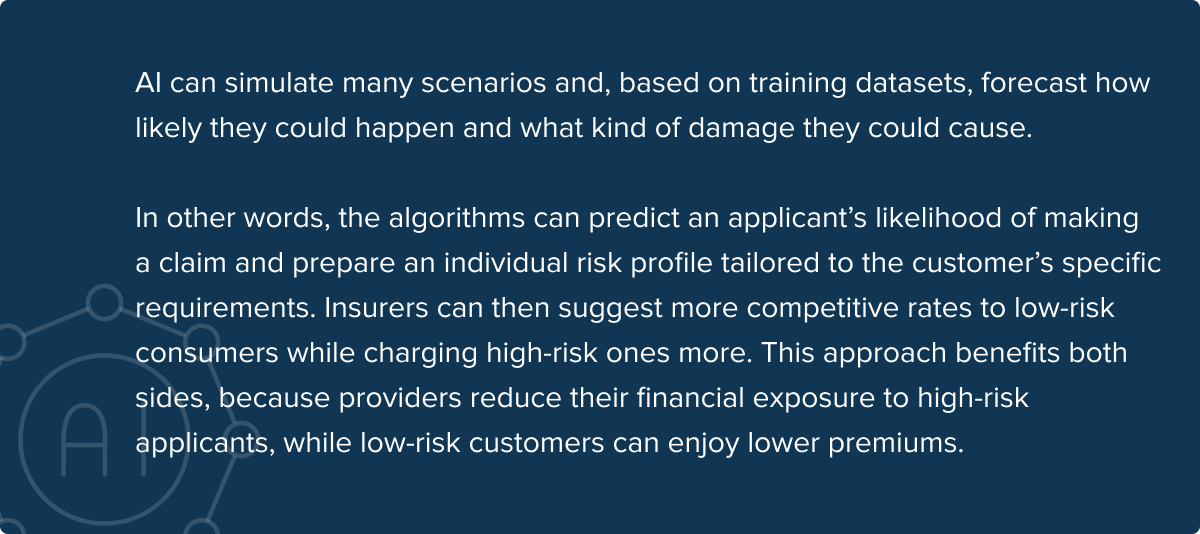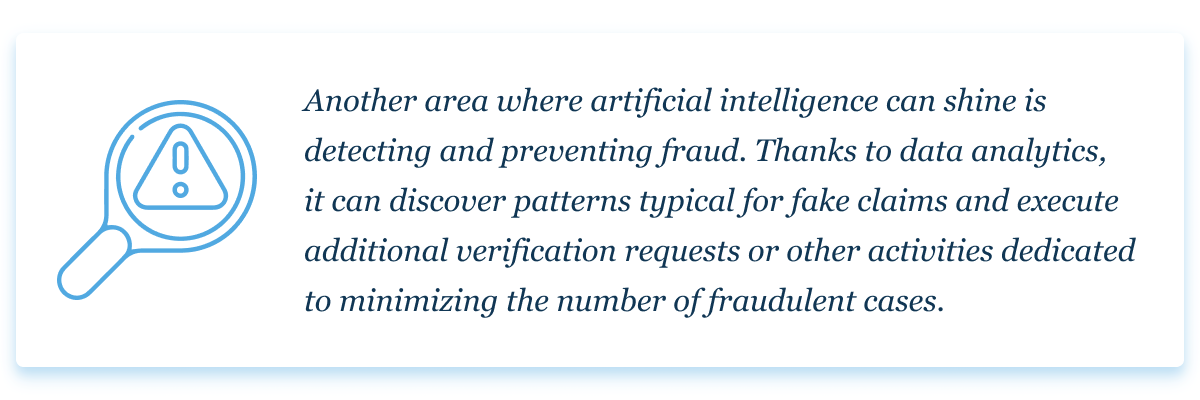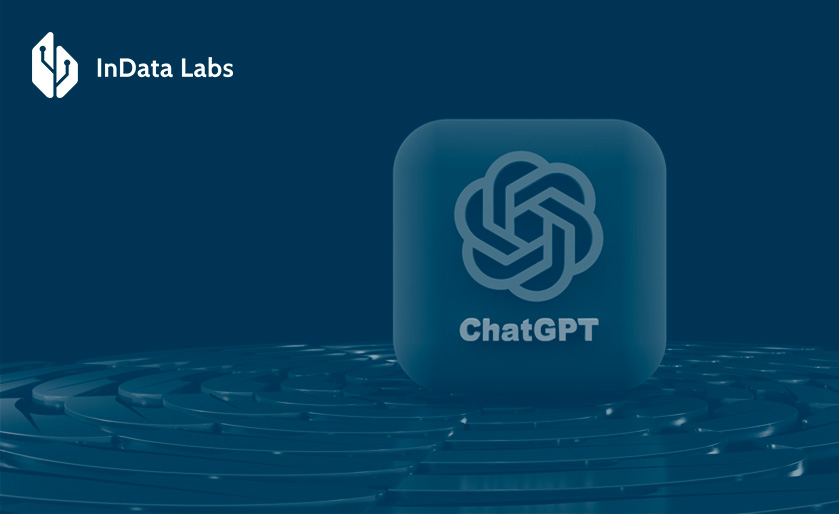The insurance industry has always relied on accurate data analysis and informed decision-making. That’s why AI in insurance is such an exciting and interesting idea. Algorithms can potentially revolutionize this sector in many areas, from underwriting to risk assessment. It could also change the overall customer experience to make it more friendly, understandable, and positive in general.
As we move further into 2023, the impact AI could have on insurance services (and other business niches) is becoming increasingly apparent. This article explores how artificial intelligence will serve the insurance industry and what we can expect in years to come. We will discuss the automation of various processes and how AI could influence this complex niche to ensure improvement.
Additionally, we will also take a look at the important ethical and regulatory considerations that should be addressed to make AI for insurance safer to use. By examining AI examples and trying to predict possible future trends, we hope to shed light on all the potential AI can bring to the insurance sector and inspire providers to embrace the transformative potential of this technology. Let’s start with the basics.
How technology is changing the insurance industry?
Insurance brands have been traditionally associated with paper-based processes and face-to-face interactions. However, advancements in technology have disrupted the industry, providing new opportunities for insurers to innovate and upgrade their business operations. From reducing ordinary paperwork and digitization to developing sophisticated algorithms for various purposes, the insurance industry is changing in numerous ways thanks to technology.
It already started some time ago. When something happens, we don’t need to call the agent, schedule a meeting, and provide tons of documents. Claim management can be done entirely online thanks to advanced applications and sophisticated forms. Such software solutions powered with artificial intelligence can adjust the whole process to the customer’s individual needs, analyze delivered information, and streamline the next steps like requiring additional data or admitting compensation.

Source: Unsplash
One example of automated claim management would be the AI-powered solution we developed for our client. Their main difficulty was processing claims quickly and accurately, which is one of the major challenges within the industry.
We’ve created a simple-to-use app that utilizes OCR (optical character recognition) to streamline the claims handling process, which significantly decreased the time required to manage a single case. Employees’ productivity skyrocketed, as well as customer satisfaction. It proves that AI can definitely power up insurance brands if implemented the right way.
Now, we should take a closer look at the main algorithms that are used for advanced insurance-related operations.
Machine learning and insurance
As a subset of AI that is capable of learning and improving itself based on prepared training data, machine learning can be utilized for a plethora of activities related to insurance. It can be particularly useful in data analytics which is one of the main pillars of this industry. Identifying patterns, predicting future trends, and forecasting potential challenges can not only improve customer experience but also help providers to generate better offers, increase operational performance, and optimize their resources.
According to a recent study by Accenture, the adoption of artificial intelligence and machine learning is a chance to significantly refine almost any part of the value chain. The main factors that drive these pivots are the tendencies towards making our world more smart, connected, and open source. We also strongly rely on technology to become our partners and be able to communicate with us in an almost human-like way.

Source: Unsplash
Why does it all matter for insurance? Because these technological advancements powered by machine learning can have an enormous influence on how insurance companies will operate.
For example, the Internet of Things (IoT) presents an opportunity to automate the process so much, that the insurance provider will be informed about a potential case within seconds of an event. A smart car could diagnose damages and send the information to kickstart the compensation process right away. Since the global IoT network is estimated to have approximately 30 billion devices connected by 2030, this scenario could be possible sooner than we imagine.
Deep learning in insurance
Another type of algorithm that thrives within the insurance sector is deep learning. It proved itself in a range of tasks related to the insurance industry like cost optimization, creating personalized offers, fraud detection, and sped-up settlements. Insurance is a sector that experiences many challenges and thus can sometimes be frustrating for customers. Companies that don’t rely on technology will quickly lose competitive advantage and will be abandoned for providers that automate their processes and ensure exquisite customer service. An example of a provider that harnessed deep learning to boost their operations was AXA, which used these algorithms to optimize their pricing strategies and increased their predictions’ accuracy by 78%.
Deep learning is an ally for brands that want to accelerate their operations because it can predict patterns, produce insights, and detect anomalies in vast datasets. It can be great for insurers that rely on a multitude of constantly changing factors. The example case here would be the weather’s impact on agriculture.
Another niche of insurance that can take advantage of deep learning is healthcare. Assessing one’s medical history, test results, or even family genetics would allow insurance companies to provide tailor-made offerings adjusted to the potential risks a customer could be prone to. A brand that decided to base their health insurance offer on deep learning algorithms is Marpai Health which processes a multitude of data (from lab tests to radiology scans, texts, and multi-type sources of information) to predict health events and prevent expensive claims.

Source: Unsplash
Since we’ve mentioned data analytics, it’s worth underlining that deep learning algorithms also excel in checking images, videos, audio, and other types of media which means they can be extremely helpful when processing claims. They can review documentation with photos and clips to find out exactly what happened, who was responsible, and why a certain event occurred.
An approach based on technology eliminates potential human errors, increases accuracy, and makes the whole process faster. We will dive deeper into use cases and particular areas that can be enhanced with AI below.
AI applications in insurance
Now, we will discuss how exactly AI can refine the insurance industry. Algorithms can be used in the majority of operations. They can be involved in planning tasks, providing proposals, processing claims, and optimizing internal and external requests. Let’s take a closer look.
Underwriting
The most essential element in the insurance sector is underwriting. It’s the process of evaluating risks and determining the appropriate policy offers adjusted to the customers’ needs. Thanks to artificial intelligence, it can become more efficient, accurate, and personalized.
One of the most significant impacts of AI on underwriting is the automation of the whole process. Before that, insurance reps had to manually review applications, collect data, and analyze risks to determine the appropriate premium. It consumed a lot of time and caused many errors. Thanks to ChatGPT and AI-powered software, insurers can automatically collect and analyze data within seconds, reducing the effort required to underwrite policies. Decision-making becomes more consistent and objective, too.
Risk assessment
Another important change AI introduced is better risk assessment. Before, they were performed mostly based on historical data, which was limited and often inaccurate. Now, insurance tools powered with algorithms can consider numerous elements when predicting potential risks. Some of them include medical records, occupation, lifestyle habits, credit scores, driving records, location, and more. Each of these factors can have a significant influence on the potential risks a customer can experience.

Hippo is a company that offers home insurance and takes advantage of a described business model. They use AI to not only streamline their quoting process but also to provide adequate prices adjusted to the customers’ risk profiles. For many of their clients, that means premiums lower by even 25% compared to competitors.
Personalization of policies
Identification of behavioral patterns, preferences, and risk factors enables insurers to customize policies for specific clients, which means they pay for offers with true value for them, their families, and their businesses. If they want to claim compensation, it’s more likely they will get the real equivalent of damages or an amount adequate to an event it corresponds with. All that thanks to advanced analysis performed by AI.

Source: Unsplash
For example, in usage-based policies, algorithms could review the actual usage of a product or service to determine what the customer will get in case of an unpredictable event. It could be particularly useful for car insurance where customers can be charged based on the number of miles, the age of the vehicle, and their driving behaviors.
Claim management
The process that is probably the most time-consuming and often tainted with delays can be streamlined thanks to AI. This way, customers can get better returns faster than when it was handled by human employees. It positively influences the overall customer experience, too.

Customer experience
To enhance the customer experience even more, insurance companies can invest in sophisticated AI-powered tools to handle communication, marketing, and sales. For example, they can use chatbots and virtual assistants to accept requests, answer questions, and deliver information. These tools can also remind customers about upcoming payments, notify them about promotional discounts, or send messages regarding their open claims.
A few examples of streamlining insurance companies’ communication include:
- LivePerson is a company that delivers AI-based chatbots and WhatsApp integrations for insurers that want to automate customer queries and improve overall user experience. They worked with mdabroad, Zurich Insurance, and Bupa Group.
- In 2017, Geico Insurance implemented a virtual assistant named Kate that was based on AI algorithms.
- Sensely is another brand that builds sophisticated AI chatbots for insurance enterprises. Their clients include AXA, Allianz, and Amgen.
AI and ChatGPT’s role can be crucial from the very beginning of the provider research process. Algorithms can be responsible for providing individual recommendations for customers that are looking for the best policies and helping them pick the company with the best offers based on picked parameters. Then, the technologies can guide the customer step-by-step when filling in the application and buying the policy for a seamless experience.
AI insurance industry – ethical and regulatory considerations
As AI continues to shape the insurance industry, it’s important to consider all the challenges that might occur. Providers should try to conquer them to be sure their reputations won’t be compromised. It’s also necessary to be aware of them for legal reasons. Here are the top three key areas that should be addressed:
Data privacy
One of the most significant concerns (since the insurance sector requires access to large amounts of personal data) focuses on sensitive information like health and financial records. AI is usually used to process and analyze information, which means individuals’ privacy might be at risk.
To address these potential issues, insurance companies must comply with relevant data protection laws. This includes the implementation of robust security measures to protect personal data, as well as transparency about data-related activities performed within the organization.

Source: Unsplash
Bias and fairness
This consideration applies to all applications of AI. Algorithms learn from data provided by training parties. These datasets are not always perfect and can be full of false information, biased judgments, and other harmful ideas. It’s quite important to control this factor and try to eliminate it as much as possible. Especially when it comes to insurance, where discrimination related to race, gender, sexuality, and other variables could amplify existing biases and lead to negative consequences.
AI used in the insurance sector should be trained using diverse data that represents the population as a whole. Regular algorithm monitoring and audits should also be performed to detect potential biases before they emerge.
Regulatory compliance
AI is an ally in many areas of the insurance business, but it has to be regulated to make sure it’s used the right way. Besides data privacy and anti-discrimination matters mentioned above, the law should also cover such issues as fair competition, copyright, cybersecurity, and more.

Regulators will probably introduce new legislation and guidelines related to the use of AI quite soon. They will focus on algorithms in general, but many of these regulations will apply to insurance and other industries that operate with sensitive data. Insurers must stay up to date with these developments and take proactive steps to ensure compliance.
AI in insurance – use cases by industry
Innovative insurance ideas are implemented in various sectors of this broad industry. Every type of property, business facility, and material object can be insured. Policies are also offered for people to help them feel safe in terms of health and give their families protection in case of an unexpected event.
Let’s see how artificial intelligence algorithms can enhance each area of the insurance business.
AI and health insurance
Health insurance is one of the most prominent fields, especially in countries without universal public healthcare. It’s also quite challenging for providers because it’s impossible to predict certain health-related risks. However, thanks to AI, the thorough analysis of medical history, lifestyle, and even previous occurrences of diseases within a customer’s family allows insurers to make better underwriting decisions and propose individual policies that reflect one’s risk profile.
AI algorithms can also be used to detect diseases in their early stages by analyzing medical records and identifying patterns that may indicate the presence of a particular condition.
An excellent example of a brand that does that is Freenome, an organization focused on preventing cancer. They use the power of ML and data analytics to detect potential threats early and introduce matching treatments. Such solutions can help insurers intervene early and improve the health of their policyholders. Even if someone is prone to certain illnesses due to their genetics, they can buy insurance that will secure them and their loved ones when they have to be treated.
Health insurers can also utilize AI to provide their customers with advice to help them maintain better lifestyles and promote healthy habits. They can generate diet and exercise plans, help people prevent chronic diseases, and support their health-related goals. The most advanced brands have ChatGPT-based tools that connect to wearable devices to collect health data and monitor the most important lifestyle factors. It’s not only a great way to care for customers’ well-being, but it can also allow insurers to give policy discounts for individuals that care about their health and strengthen it with their choices.

Source: Unsplash
Claim management in the healthcare sector can be particularly tricky as there are usually tons of documents to analyze. The process can take weeks or even months. Automation by AI could speed up the process and lead to a preferred experience by solving cases within a few days. Since health is the most important asset people have, it’s important to ensure seamless customer service and handle claims as quickly as possible.
An example of a health insurance provider that utilizes AI is Oscar Health. With a help of algorithms, it not only maintains the best possible experience when it comes to buying relevant insurance policies, but it also assists customers in a multitude of healthcare-related activities.
AI home insurance
Risk assessment is probably the most important part of issuing home insurance policies. There’s a variety of factors to consider, including the property’s location, condition, and history. Underwriting personalized policies that reflect a specific risk profile for a house or a flat is necessary to give the customers security they desire.
Claim management can also be streamlined, which is crucial, especially in case of unpredictable events like fires, floods, or earthquakes. AI can analyze images and videos that illustrate property to determine the extent of the damage and the estimated cost of repairs.

Source: Unsplash
AI once again can act as a customer engagement rep by not only providing personalized policy recommendations based on the individual requirements of a property owner. It can also advise policyholders on security measures and risk mitigation. Algorithms are providers’ allies when it comes to detecting fraudulent claims, too. Identifying suspicious activities based on pattern analysis can increase the accuracy of claim management and decrease unnecessary costs.
An interesting instance of AI application in the home insurance sector is the use of drones to research their client’s property conditions or inspect damages. Insurers can use these machines to verify the state of buildings after a natural disaster or other events, reducing the need for claim adjusters to physically visit these locations. This way, the whole compensation process can be accelerated. Drones can also be useful for preventive activities. State Farm introduced such a system in 2019 to define their customers’ risks and determine how to avoid them.
A company that harnessed the potential of AI for improved home insurance is also Lemonade. It utilizes algorithms for a plethora of tasks and automates their processes to provide a seamless experience. They claim that buying an insurance policy and getting compensation are equally quick and easy actions.
Artificial intelligence in auto insurance
Car insurers also have to put a lot of focus on risk assessment. Before they did that just by estimating parameters like years of having the license, accident history, vehicle’s age, brand, and technical state. Analyzing all of this data took reps enormous amounts of time and still wasn’t accurate enough to offer marketable policies. AI algorithms can take more factors into consideration. For example, it can analyze driving habits and behaviors to determine risk profiles and adjust insurance according to them.
Discussed above benefits like better claim management thanks to visual analysis and customer engagement strategies with personalized content also apply in car insurance.
For example, AI can deliver safe driving practices to prevent accidents and reduce the likelihood of future claims or estimate damages by reviewing videos or images from car crash scenes. Chatbots powered with algorithms also come in handy. They answer policyholders’ questions and ensure assistance with claims processing, reducing the workload of customer service representatives and improving the overall customer experience.

Source: Unsplash
However, the big game changer is telematics which is the process of collecting, processing, and analyzing data generated by devices installed in cars. They can measure all the parameters including speed, acceleration, braking, driving dynamics, and more. The information gained this way can be used to understand driver behavior, assess risk, provide personalized policies that reward safe driving practices, as well as get additional data if something happens.
An AI-driven car insurance company we should mention is Root Insurance. They use algorithms for a variety of tasks and simplify all the processes regarding auto insurance. For example, they implemented Contact Center AI to manage voice calls, monitor compliance, and prepare tailor-made training plans for their employees.
Life insurance with AI
Life insurance is also transformed by algorithms and the sector can take advantage of all the mentioned-above perks like better risk assessment, improved underwriting, personalized customer experience, and faster claims management. This sector probably has to analyze the biggest datasets with numerous variables from categories like health, lifestyle, location, genetics, and past. Thanks to AI, insurers can make more informed, detailed decisions when preparing custom life policies.

Source: Unsplash
A company that harnessed AI to provide robust life insurance is Lapetus Solutions. They cover a wide range of services including wealth and finance management. Their website states that their investments in tech and algorithms are dedicated to providing fair conditions for all their customers while assuring the highest levels of privacy and security.
AI adoption in insurance – future predictions
As insurers continue to embrace the potential of AI, 2023 and beyond will be the years of emerging trends, widespread adoption, and even more technological advancement. What is the future of the insurance industry and artificial intelligence? Here are the forecasts:
Full automation
The increasing use of machine learning and other forms of AI in various sectors will lead to automation levels we’ve never seen before. Some tasks will be done entirely by computers, which will transform the job market within the insurance industry. That doesn’t mean machines will replace humans, but employees that don’t have any AI-related knowledge and skills will have a tough time finding a job.
Underwriting and claim management will probably be the two fields that will be automated the most, significantly decreasing the need for human interference. Some specialists estimate that up to 90% of cases will be solved within minutes and only 5% will have to be checked by reps. The results will be more accurate and fair, which will also lower the number of complaints.

Source: Unsplash
Conversational AI
Another AI case that applies to a broad spectrum of businesses and can boost the insurance industry is chatbots, virtual assistants, and conversational tools. They are a great way to lower the costs of support and save a lot of time since machines can handle thousands of customers simultaneously and at all times.
Answering queries, preparing personalized offers, processing claims, and lead generation are only a few things AI-powered solutions can do. The main benefit is the reduction of the workload sales reps and customer service employees have to handle on a daily basis and enhanced user experience.

Source: Unsplash
The Internet of Things (IoT)
We’ve mentioned above that IoT can be one of the most disruptive technologies when it comes to the insurance niche. That’s because the more devices are online and connected, the more data can be collected and analyzed.
For insurance companies, it’s crucial to always have access to real, accurate information. This way they can make better decisions and propose beneficial conditions. Temper-proof records of policyholders’ health, behavior, and lifestyle will influence the premiums and will make all the insurance-related processes easier and faster.
Blockchain
Blockchain can be used to create secure environments for insured customers where payments, documents, messages, and private data are encrypted to guarantee the highest level of protection. Providers that will invest in such solutions will be more trustworthy and reliable. Smart contracts are already supporting businesses in verifying transactions and exchanging files, which is a great opportunity for insurers to adopt this technology as well.

Source: Unsplash
Custom solutions
AI software development is thriving and insurers will definitely invest in algorithm implementation that is tailor-made to their needs. Finding the right provider that will be able to prepare an AI-based system will be essential to widespread adoption. Such partners will be able to help insurance brands navigate through the complex technological landscape and ensure that their solutions are scalable, secure, and valuable to their businesses and customers.
Conclusion
The impact of AI on the insurance sector is already apparent, and it will continue to shape the industry in the upcoming years. From claims processing to risk assessment, AI is already revolutionizing the way insurers operate and interact with their customers. By leveraging the power of AI, insurance companies can improve efficiency, reduce costs, and deliver a more positive experience for their policyholders.
In 2023 and beyond, it’s clear that AI will play an increasingly important role in the insurance industry. It’s up to individual companies to embrace this technology and use it to their advantage. For those who do, the benefits are clear. They will gain a competitive advantage and level up their operations, which will result in revenue growth and better service quality.
We can help you implement AI into your business
At InData Labs we are committed to helping companies unlock their full potential. If you’re interested in learning more about how we can help you implement a custom AI solution, don’t hesitate to contact us. Our team of experts is ready to help you create an AI-based system that’s right for your business.



